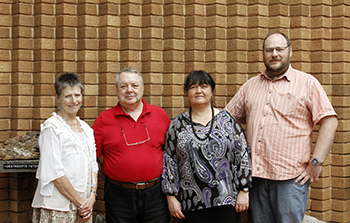Latest News Archive
Please select Category, Year, and then Month to display items
22 September 2021
|
Story Michelle Nöthling
|
Photo Supplied
 Annemarie Le Roux.
Annemarie Le Roux.
“I love working with children.” This is one of the first things Annemarie le Roux mentions when asked to describe herself. This love for children propelled Annemarie into the field of education and she graduated in 2006 with a BEd in Foundation Phase at the UFS. Annemarie immediately immersed herself in the Deaf community, enriching the lives of children at the Thiboloha School for the Deaf in Qwaqwa and the De la Bat School for the Deaf in Worcester.
The academic world enticed Annemarie back to the University of the Free State (UFS) and she was appointed as a junior lecturer in the Department of South African Sign Language (SASL) and Deaf Studies in 2013. Going from strength to strength, Annemarie completed her master’s degree in SASL in 2019, and published an
article earlier this year that she co-wrote with Marga Stander. In this article, they found that SASL “has become an increasingly popular language that hearing university students want to learn as a second language” and subsequently explored different teaching methods used for this emerging group of interested students.
Although now firmly established in academia, Annemarie is still committed to the practical application of SASL. “I am closely involved in student and community engagement through the
SIGNALS Sign Language student association that helps empower the Deaf community and South African Sign Language.” She also interprets for the Deaf community whenever she gets an opportunity, as well as for Deaf students in class and meetings.
On the importance of Sign Language and the recognition of the Deaf community in South Africa, Annemarie believes it will open greater opportunities for development. “More people will be able to learn SASL, and it might even become a subject in school for hearing children.”
Famous mineralogists visit UFS Geology
2017-04-25

From the left: Prof Marian Tredoux, Associate
Professor at the UFS Department of Geology;
Prof Giorgio Garuti; from the University of Leoben,
Dr Federica Zaccarini, also from the
University of Leoben and Dr Freddie Roelofse,
Head of the Department of Geology at the UFS.
Photo: Rulanzen Martin
Years of academic friendship and collaboration is what makes Prof Giorgio Garuti and Dr Federica Zaccarini return to the University of the Free State (UFS) every so often.
The world-renowned academic duo from the University of Leoben in Austria were guest lecturers at the UFS Department of Geology. “We are here because we have known Professor Marian Tredoux and the Geology Department, for a long time. We are really happy to be here, and to be given the opportunity to present talks,” said Dr Zaccarini. The two are experts in platinum-group element mineralogy and each has given their surname to minerals namely, the Garutiite and Zaccariniite minerals.
Visit great advantage for research
They are acclaimed experts on very small minerals (smaller than a hundredth of a millimetre) with emphasis on platinum group elements in chrome-rich rocks. “Their visit is a great advantage for us. We also conduct research on these minerals and can learn from them,” said Prof Marian Tredoux, affiliated researcher at the Department of Geology.
Dr Zaccarini gave a lecture on Chromitites, and associated platinum-group elements, in ophiolites on Wednesday 5 April 2017 and Dr Garuti presented a lecture on Uralian-Alaskan complexes: a puzzling source of platinum, on Thursday 6 April 2017. During the talks they examined the association of the platinum-group minerals with chromite, rather than sulphide, and how this association can lead to the formation of unusual platinum-group element ores.
Collaboration on various academic papers
They and Prof Tredoux have collaborated on various research articles over the past four years, which have been published in various important international scientific journals. “These journals play an important role in calculating the H-scale which measures how important a researcher’s work is on an international scale,” said Prof Tredoux.